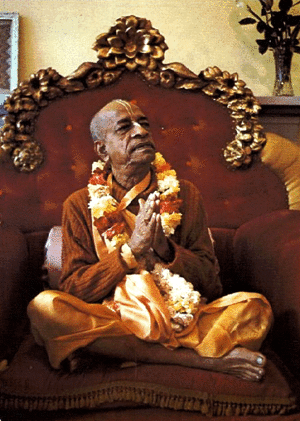A.C. Bhaktivedanta Swami Prabhupada
His Divine Grace A. C. Bhaktivedanta Swami Prabhupada appeared in this world in 1896 in Calcutta, India. He first met his spiritual master, Srila Bhaktisiddhanta Sarasvati Gosvami, in Calcutta in 1922. Bhaktisiddhanta Sarasvati, a prominent religious scholar and the founder of sixty-four Gaudiya Mathas (Vedic Institutes), liked this educated young man and convinced him to dedicate his life to teaching Vedic knowledge. Srila Prabhupada became his student, and eleven years later (1933) at Allahabad he became his formally initiated disciple.
At their first meeting, in 1922, Srila Bhaktisiddhanta Sarasvati Thakura requested Srila Prabhupada to broadcast Vedic knowledge through the English language. In the years that followed, Srila Prabhupada wrote a commentary on the Bhagavad-gita, assisted the Gaudiya Matha in its work and, in 1944, started Back to Godhead, an English fortnightly magazine. Maintaining the publication was a struggle. Single-handedly, Srila Prabhupada edited it, typed the manuscripts, checked the galley proofs, and even distributed the individual copies. Once begun, the magazine never stopped; it is now being continued by his disciples in the West and is published in over thirty languages.
Recognizing Srila Prabhupada's philosophical learning and devotion, the Gaudiya Vaisnava Society honored him in 1947 with the title "Bhaktivedanta." In 1950, at the age of fifty-four, Srila Prabhupada retired from married life, adopting the vanaprastha (retired) order to devote more time to his studies and writing. Srila Prabhupada traveled to the holy city of Vrndavana, where he lived in very humble circumstances in the historic medieval temple of Radha-Damodara. There he engaged for several years in deep study and writing. He accepted the renounced order of life (sannyasa) in 1959. At Radha-Damodara, Srila Prabhupada began work on his life's masterpiece: a multivolume annotated translation of the eighteen-thousand-verse Srimad-Bhagavatam (Bhagavata Purana). He also wrote Easy Journey to Other Planets.
After publishing three volumes of the Bhagavatam, Srila Prabhupada came to the United States of America, in September 1965, to fulfill the mission of his spiritual master. Subsequently, His Divine Grace wrote more than sixty volumes of authoritative annotated translations and summary studies of the philosophical and religious classics of India.
When he first arrived by freighter in New York City, Srila Prabhupada was practically penniless. Only after almost a year of great difficulty did he establish the International Society for Krishna Consciousness, in July of 1966. Before his passing away on November 14, 1977, he guided the Society and saw it grow to a worldwide confederation of more than one hundred asramas, schools, Temples, institutes and farm communities.
In 1968, Srila Prabhupada created New Vrindaban, a farm community in the hills of West Virginia. His students have since founded several similar communities in the United States and abroad.
In 1972, His Divine Grace introduced the Vedic system of primary and secondary education in the West by founding the Gurukula school in Dallas, Texas. Since then, under his supervision, his disciples have established children's schools throughout the United States and the rest of the world, with the principal educational center now located in Vrndavana, India.
Srila Prabhupada also inspired the construction of several large international cultural centers in India. The center at Sridhama Mayapur in West Bengal is the site for a planned spiritual city, an ambitious project for which construction will extend over many years to come. In Vrndavana, India, are the magnificent Krsna-Balarama Temple and International Guesthouse, and Srila Prabhupada Memorial and Museum. There is also a major cultural and educational center in Bombay. Other centers have since been built in New Delhi and others are planned in important locations on the Indian subcontinent.
Srila Prabhupada's most significant contribution, however, is his books--he translated from Sanskrit into English and commented on over 100 books. Highly respected by the academic community for their authority, depth and clarity, they are used as standard textbooks in numerous college courses. His writings have been translated into over fifty languages. The Bhaktivedanta Book Trust, established in 1972 to publish the works of His Divine Grace, has thus become the world's largest publisher of books in the field of Indian religion and philosophy.
In just twelve years, in spite of his advanced age, Srila Prabhupada circled the globe fourteen times on lecture tours that took him to six continents. In spite of such a vigorous schedule, Srila Prabhupada continued to write prolifically. His writings constitute a veritable library of Vedic philosophy, religion, literature and culture.

